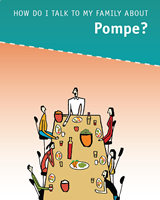All Genetic Alliance content, except where otherwise noted, is licensed under a Creative Commons Attribution License, which permits unrestricted use, distribution, and reproduction in any medium, provided the original work is properly cited.
NCBI Bookshelf. A service of the National Library of Medicine, National Institutes of Health.
Genetic Alliance; Genzyme. How Do I Talk to My Family About Pompe? Washington (DC): Genetic Alliance; 2012.
This publication is provided for historical reference only and the information may be out of date.
What is family?
There is no one-size-fits-all family. Your family is the group of people who are important to you and your well-being. They might be related to you biologically, legally (through adoption or marriage), or emotionally (through affection, dependence, obligation, or cooperation).
Why should I talk to my family about Pompe?
Pompe is a rare condition (relative to other chronic health conditions). Most people do not know what it is and may never have heard of it. You may find that even some doctors and other healthcare professionals do not know much about it.
It is important to help both your family and your healthcare providers understand what Pompe is, what it means for you, and how your diagnosis might impact your family. Some topics to share are major signs and symptoms and how the condition is passed down in families. [Turn to page 2 for more information on Pompe.]
Sharing your story will help your relatives understand their family health history and possibly even their own personal history. Knowledge of your symptoms and the reason for them—Pompe disease—may help relatives make sense of their own physical experience, especially if they have had symptoms medical professionals have been unable to explain. In turn, it is helpful for you to know your whole family health history, including Pompe and other conditions that might run in your family. Putting the whole picture together will help you and your relatives:
- Identify risks due to shared genes.
- Talk to each other about health (including quality of life).
- Summarize health information to give to healthcare providers, as well as colleagues, teachers, and others.
- Introduction - How Do I Talk to My Family About Pompe?Introduction - How Do I Talk to My Family About Pompe?
- Homo sapiens calnexin (CANX), transcript variant 9, mRNAHomo sapiens calnexin (CANX), transcript variant 9, mRNAgi|1395168465|ref|NM_001363999.1|Nucleotide
- Tssr131558 AND (alive[prop]) (0)Gene
Your browsing activity is empty.
Activity recording is turned off.
See more...
